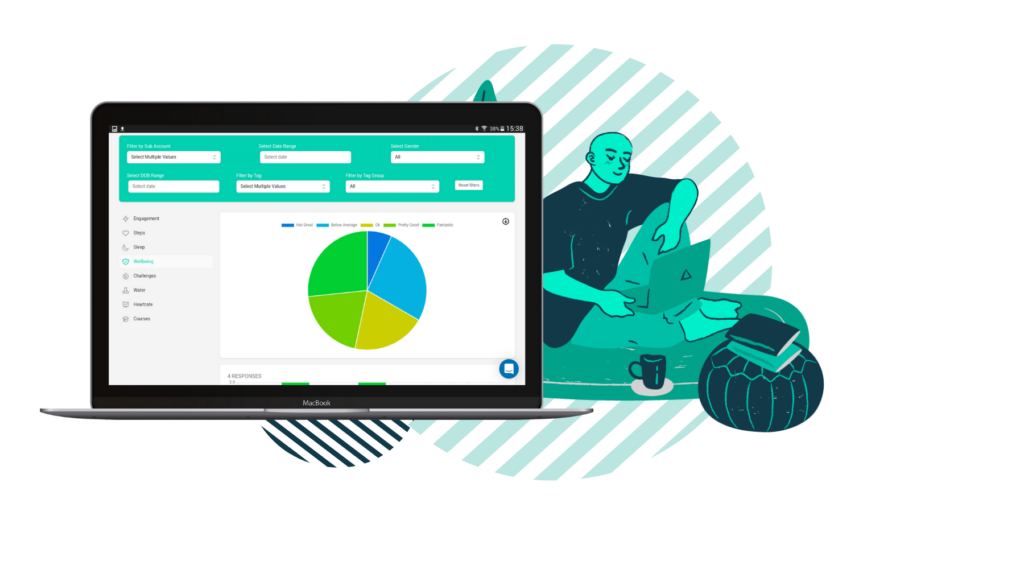Covid-19 restrictions have eased considerably in the UK in recent weeks, and there have even been suggestions that the end of the pandemic may be in sight, however, for the many people living with Long Covid symptoms, the long-term effects of catching Covid-19 are still very much an everyday reality.
In this blog, we’ll explain what Long Covid is and how it might affect employees. We’ll also make suggestions for supporting employee wellbeing through Long Covid.
What Is Long Covid?
Most people who catch Covid-19 will recover from the illness within a matter of days or weeks, however, for some people, the symptoms of Covid-19 can linger on for several weeks or even months after the initial infection. This is referred to as Long Covid.
It’s not yet known why some people get Long Covid and others don’t but it doesn’t seem to be related to how severe your initial Covid symptoms are, as even those with a mild infection can go on to experience long-term health problems.
Symptoms of Long Covid vary from individual but can include:
- Fatigue
- Insomnia
- Shortness of breath
- Chest pain or tightness
- Memory problems or difficulty concentrating
- Heart palpitations or dizziness
- Gastrointestinal problems
- Joint pain or pins and needles
- Depression and anxiety
- Hearing problems and earaches
- Rashes
These may be experienced alongside the typical symptoms of Covid-19 such as fever, cough, headaches, a sore throat and loss of taste or smell.
Figures vary, but the latest statistics from ONS suggest that approximately 1.5 million people in the UK are currently living with Long Covid.
How Long Covid Might Affect Employees At Work
Experiencing ongoing Covid-19 symptoms and being diagnosed with Long Covid is highly likely to impact a person’s work life.
Long Covid might affect employees in a number of ways, the most obvious of those being that they are more likely to take extended or more frequent periods of sickness and absence.
Like many long-term conditions, Long Covid is not predictable and how a person feels and what they are capable of one day will not necessarily translate to the following day. This means that an employee may appear to be improving or feel ready to come back to work but that their recovery may not be linear and they may experience a setback or re-occurrence of symptoms that could make it difficult for them to do their job or might require a further period of sick-leave.
Even after their return to work, it may become apparent that an employee is unable to carry out their existing role in the way they could previously or that aspects of their role exacerbate their Long Covid symptoms. Likewise, an employee may appear to be coping well on their return but may find themselves exhausted and burnt-out on their days off. Employees with Long Covid should be offered support to continue working without compromising their health.
How To Support Employee Wellbeing Through Long Covid
Thankfully, there are several ways that employers can help support employee wellbeing through Long Covid.
Keep In Touch
When employees are absent from work due to Long Covid, it’s important to keep in touch and find out how they are doing so that they don’t feel forgotten about or isolated and so you can offer support if and when they feel able to return to work.
Offer Phased Return
Employees with Long Covid may be apprehensive about returning to work. On the one hand, they may be eager to get back to normal, but on the other, they may be anxious about whether or not they will cope and may feel out of touch, especially if they have been off sick for a long time. Offering a phased return allows employees to ease back into work over the course of several days or even weeks if necessary, slowly building up their hours and confidence.
Modify Hours or Workload
When supporting an employee through Long Covid, you will need to discuss any modification that they might need to their working hours or workload. It’s important to be realistic about what’s achievable so that your employee doesn’t feel overwhelmed.
Consider Adaptations
As well as possible changes to working hours, you might need to consider adaptations to the employee’s role or the working environment. These could be simple things, like encouraging them to take regular breaks, allowing them to sit down at a reception desk rather than standing for long periods or offering flexi-working or remote working options.
Don’t Forget Mental Health

Though many of the symptoms of Long Covid are physical, it’s vital to remember that it will likely affect an employee’s mental health, also. Long Covid has been linked to anxiety and depression so remember to ask your employees about their mental health and offer support where needed.
Encourage Wellbeing
Encouraging employee wellbeing can help those struggling with Long Covid symptoms to recover quicker. Refer them to Occupation Health and highlight any additional services that may be able to help with their recovery. Our Wellbeing application helps colleagues improve their wellbeing with regular helpful nudges to improve their lifestyle, plenty of content to encourage them, and a handy tracker so they can see their improvements.
Offer Reassurance
Employees with Long Covid may feel anxious that they are no longer able to do their role the way they did previously. They may be worried about letting people down, compromising their health and even potentially losing their job. Offering reassurance lets them know that they are supported and valued.
Get In Touch
We hope this blog has given you some ideas about supporting employee wellbeing through Long Covid.
Wellspace offers expert and accessible wellbeing support to employers and organisations with a workplace wellbeing app that helps employees monitor and improve their wellbeing as well as comprehensive health and wellbeing training.
For more information about how Wellspace can help you support employees with Long Covid and prioritise employee wellbeing in your organisation, get in touch today. You can also email info@yourwellspace.com or call us on 0808 178 0748.











